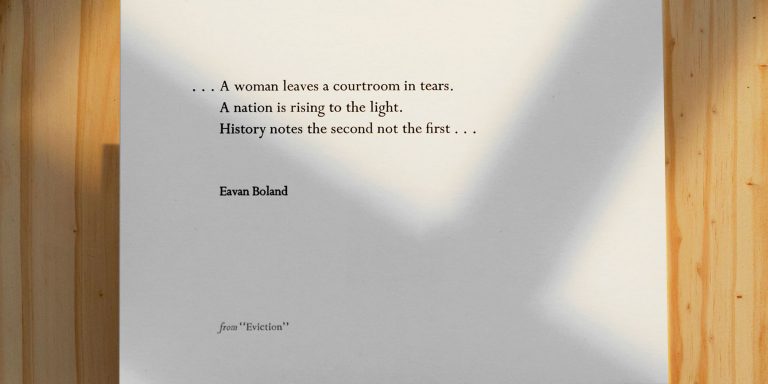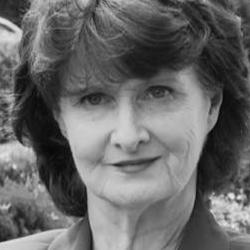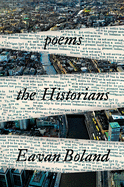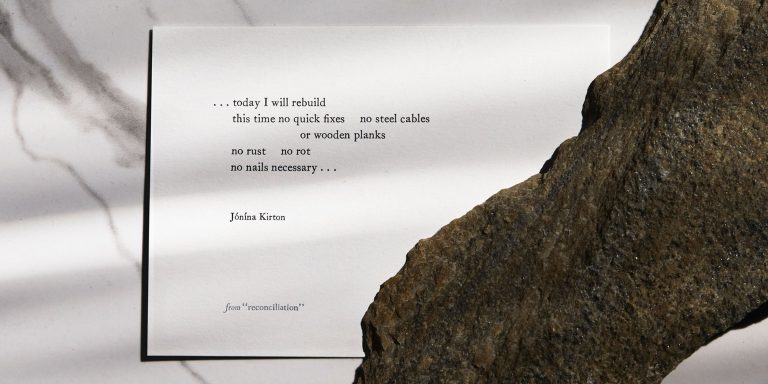Eavan Boland
Eviction
This poem offers critique into a moment of Irish history when Ireland, through independence, was rising to the light. But Irish women were facing lives as constricted in independence as under empire. Decades later, Eavan Boland reads a newspaper of her grandmother’s near-eviction and is consumed both by rage and critique of how history concerns itself with the politics of men, not women. This poem is a corrective, turning the gaze on historians, as well as history.
Letterpress art by Myrna Keliher.

Photography by Lucero Torres. Image by Lucero Torres, © All Rights Reserved.
Guest

Eavan Boland was an Irish poet, author, and professor at Stanford University, where she taught from 1996. Her work deals with the Irish national identity, and the role of women in Irish history. Her books of poetry include The Historians: Poems, Against Love Poetry: Poems, New Collected Poems, and many more.
Transcript
Pádraig Ó Tuama: My name is Pádraig Ó Tuama. And one of the things that poetry does is it preserves stories. Sometimes those stories are the huge stories of the day or of history, other times they’re personal stories. And so paying attention to the small ways within which a particular poem can disrupt a big telling of an old history — of Ireland, say, of Ireland’s independence — I have always loved finding poems that take a different beginning point and begin to pull apart a thread of a story to say, “Maybe it wasn’t all like that.”
[music: “Praise the Rain” by Gautam Srikishan]
“Eviction” by Eavan Boland:
“Back from Dublin, my grandmother
finds an eviction notice on her door.
Now she is in court for rent arrears.
The lawyers are amused.
These are the Petty Sessions,
this is Drogheda, this is the Bank Holiday.
Their comments fill a column in the newspaper.
Was the notice well served?
Was it served at all?
Is she a weekly or a monthly tenant?
In which one of the plaintiffs’ rent books
is she registered?
The case comes to an end, is dismissed.
Leaving behind the autumn evening.
Leaving behind the room she entered.
Leaving behind the reason I have always
resisted history.
A woman leaves a courtroom in tears.
A nation is rising to the light.
History notes the second, not the first.
Nor does it know the answer as to why
on a winter evening
in a modern Ireland
I linger over the page of the Drogheda
Argus and Leinster Journal, 1904,
knowing as I do that my attention has
no agency, none at all. Nor my rage.”
[music: “What Did You Not Hear” by Gautam Srikishan]
So this poem is a study and a story of Eavan Boland’s grandmother. In 1904, the grandmother had gone on a trip to Dublin from Drogheda. That’s a journey of about 50 miles. Drogheda is a large town about 50 miles north of Dublin. And when the grandmother had got home to Drogheda after having been in Dublin, she found an eviction notice on her door. And evictions carry a long history in Ireland, being used as a tool of oppression, as a tool of empire, with punishing measures — and no accountability in the setting of rents or the changing of rents by those people who were landlords, and a deep complicity between landlords and empire. At the time, in 1904, Ireland wasn’t independent yet. And so this poem is about a tiny little experience of empire.
[music: “Vulcan Street” by Blue Dot Sessions]
So the grandmother has to go to court. And it’s a petty session, which means that it’s a hearing in the court of no great importance. You know the way you might talk about petty cash in your cashbox at a business? This is a petty session. So the court didn’t see the eviction of people as being of any particular importance. And the court is meeting on a public holiday — a bank holiday, as we say here. And the matter is covered in a newspaper in a kind of an airy way, just asking questions, not about justice but about facts, unaccountable facts, do you know. It seems that the plaintiff, the landlord, seems to have a variety of rent books, which implies that the landlord owned a variety of places that he was collecting rent from. And who are the landlords? And was the grandmother paying on a weekly basis or on a monthly basis?
Anyway, the case is dismissed. And Eavan Boland in this poem manages to do two things at once, at this stage in the poem. She keeps our eye on the grandmother and, at the same time, she spans out and looks at this woman in the span of Irish history. So she says: “Leaving behind the autumn evening. / Leaving behind the room she entered. / Leaving behind the reason I have always / resisted history. / A woman leaves a courtroom in tears. / A nation is rising to the light. / History notes the second, not the first.”
So what Eavan Boland is saying in this kind of hinge point of the poem is that she’s recognizing that, in 1904 and in the couple of decades that followed, Ireland was moving toward independence, or partial independence, anyway. And anybody hearing “1904” in Irish history would know that 1921 was the partition of Ireland, the establishment of what would be the Republic of Ireland and the North. And you might think that this is the main story. But what Eavan Boland is doing is pointing us to her grandmother and saying, yes, history notes that a nation was rising to the light. But it doesn’t note that a woman leaves a courtroom in tears – leaving a courtroom in tears because of the petty way by which a legal system, whether it’s under the British empire or under an emerging Irish rule, probably doesn’t give a damn about women. And this is what she’s highlighting over and over again.
[music: “The Dustbin” by Blue Dot Sessions]
Eavan Boland has found this story in a 1904 edition of a newspaper. The newspaper is called the Drogheda Argus and Leinster Journal. And where the poem starts with a solitary woman in the early part of the 20th century, the poem is ending with a solitary woman in the early part of the 21st century. One is hopeless against a tenancy system that hated her, and the other is saying that her attention has “no agency, none at all. Nor my rage.” And it is a rage against the question as to who pays attention to the experience of women, in the context of what are considered to be large political events.
Are women’s lives not considered important enough? Are they considered subsidiary to the question of large political events? Why would there be such a distinction between telling the story of Irish women in the early part of the 20th century, as opposed to telling the story of Irish men? And this is a point that Eavan Boland is making over and over again in her poems, throughout many books. She’s pointing to the unseen that is present behind the loudness of the seen or the heard. And she’s doing this quite brilliantly.
I’m consistently struck by the last two lines: “knowing as I do that my attention has / no agency, none at all. Nor my rage.” So what does the word “agency” mean here? The word “agency” comes from a Latin word, “agere,” meaning “to do,” and you can think about the word “agency” in a few different ways. You can talk about it as a capacity for a person to enact with a sense of resilience and a sense of legal protection: “I have agency.” But you can think about it, too, maybe like a government agency: “Oh, yeah, there’s the government agency for employment or for foreign affairs.” And she’s saying, “my attention has / no agency, none at all. Nor my rage.”
In a certain sense, she’s saying the government is not setting up an agency for 51 percent of the population to pay attention to the concerns of their lives, knowing, as any government does, that the history of that country has been dependent on the women in the country but has often denied its dependency on the women of that country. And she, in a certain sense, might be calling for a Ministry of Women, but also is saying that her attention — the attention that a nation will focus on the history of a nation turning toward the light, but not the woman leaving the courtroom in tears — and here she is, I’m guessing in tears, reading about her grandmother. And she’s saying her attention even now, in the 21st century, 100 years after Ireland’s gained, mostly, independence — and she’s saying, even now “my attention has / no agency, none at all. Nor my rage.” And we’re drawn brilliantly and powerfully into the final word of this poem, “rage,” and that is such an important thing to do.
[music: “Every Place We’ve Been” by Gautam Srikishan]
The book that this poem is from is called The Historians. And in a certain sense, Eavan Boland is saying, look, historians are often seen as a kind of a detached, fact-based enterprise and writing system, whereas she is putting forward that historians are people who keep the body alive. So she’s highlighting the women in her family who lit candles or who lit fires and kept bodies fed and alive. And she’s saying, that is a history making — not a history of looking to the past but a history of creating a future that can look to the past and honor the people who kept a nation alive. And she’s highlighting that as the agency about what history is doing.
I think this poem is inviting us to look at moments in history and consider different starting points in history. Obviously, Eavan Boland is taking a monumental story of Irish history in the early 20th century — “A nation is rising to the light,” as she says — and she’s defamiliarizing that beginning point by narrating it through the lens of her grandmother. And by doing that, by starting somewhere different, you find yourself wondering, would a change in empire — Ireland moving out from under the United Kingdom into quasi-independence — would that make a difference to that woman? Would the laws of a new Ireland benefit landlords in the same way that the laws of the British empire benefited landlords? And by beginning in a new place, we begin to have a new point of view.
And that, I think, is one of the ethical backbones that you see throughout the work of Eavan Boland and that she’s calling readers to pay attention to: What would a female-narrated history of your country be? What would a history narrated by Indigenous populations of your country be? And how can we elevate those and not expect them to come in the same form as what might be considered to be the accepted history books? These are history books written in survival, written in stories, written in assertions, and written in calls for human rights.
[music: “Every Place We’ve Been” by Gautam Srikishan]
“Eviction” by Eavan Boland:
“Back from Dublin, my grandmother
finds an eviction notice on her door.
Now she is in court for rent arrears.
The lawyers are amused.
These are the Petty Sessions,
this is Drogheda, this is the Bank Holiday.
Their comments fill a column in the newspaper.
Was the notice well served?
Was it served at all?
Is she a weekly or a monthly tenant?
In which one of the plaintiffs’ rent books
is she registered?
The case comes to an end, is dismissed.
Leaving behind the autumn evening.
Leaving behind the room she entered.
Leaving behind the reason I have always
resisted history.
A woman leaves a courtroom in tears.
A nation is rising to the light.
History notes the second, not the first.
Nor does it know the answer as to why
on a winter evening
in a modern Ireland
I linger over the page of the Drogheda
Argus and Leinster Journal, 1904,
knowing as I do that my attention has
no agency, none at all. Nor my rage.”
Lily Percy: “Eviction” comes from Eavan Boland’s book The Historians. Thank you to Carcanet Press and W. W. Norton & Company, who gave us permission to use Eavan’s poem. Read it on our website, at onbeing.org.
[music: “Praise the Rain” by Gautam Srikishan]
Poetry Unbound is: Gautam Srikishan, Chris Heagle, Erin Colasacco, Eddie Gonzalez, Lilian Vo, and me, Lily Percy.
Our music is composed and provided by Gautam Srikishan and Blue Dot Sessions. This podcast is produced by On Being Studios, which is located on Dakota land.
We also produce other podcasts you might enjoy, like On Being with Krista Tippett, Becoming Wise, and This Movie Changed Me. Find those wherever you like to listen, or visit us at onbeing.org to find out more.
Books & Music
Recommended Reading
The On Being Project is an affiliate partner of Bookshop.org and Amazon.com. Any earnings we receive through these affiliate partnerships go into directly supporting The On Being Project.











Reflections